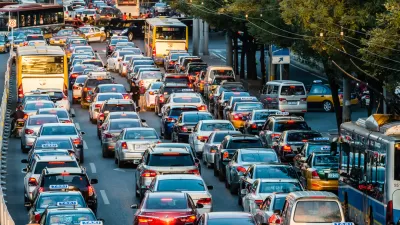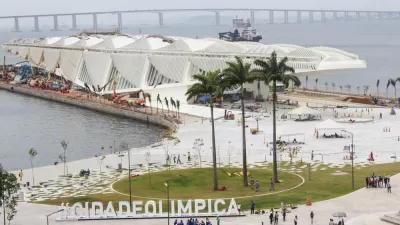As the start of London's summer games grows near, the competition to host the 2020 Olympics is heating up. Paul Sonne looks at whether the "shoestring" bid of Madrid, formed amidst Spain's austerity drive, can beat out the other finalists.
Since China poured an estimated $40 billion into Beijing's lavish 2008 coming out party, Olympic bids have generally headed in two distinct directions: cities with established infrastructure proposing more sustainable events that utilize existing facilities, and cities in emerging markets that can afford to spend more extravagantly.
Now Madrid, a finalist to host the 2020 Summer Games along with Istanbul and
Tokyo, is formulating a final bid to win an event it hopes, "would help bring 'economic and social recovery'
to Spain and boost employment, particularly for young Spaniards facing a
52% jobless rate."
According to Sonne, "The city's [Madrid's] bid committee is marketing the proposal as a shoestring
Olympics-a model designed to show how to organize the event on a tight
budget. Madrid's initial application says 78% of the sports venues
already exist in the city and only about nine structures need to be
built."
With Spain's government pushing through a €65 billion austerity program, critics are questioning if leaders should "pour public funds into a risky financial bet."
"This is not the moment to be thinking about this kind of event," says
José García Montalvo, an economics professor at Barcelona's Universitat
Pompeu Fabra, pointing to a contradiction: "If you claim that most of
the infrastructure is already built and you're not going to use a lot of
public money, then you're not going to [create] a lot of jobs."
FULL STORY: In Spain, a Thrifty Olympics Bid

Study: Maui’s Plan to Convert Vacation Rentals to Long-Term Housing Could Cause Nearly $1 Billion Economic Loss
The plan would reduce visitor accommodation by 25,% resulting in 1,900 jobs lost.

North Texas Transit Leaders Tout Benefits of TOD for Growing Region
At a summit focused on transit-oriented development, policymakers discussed how North Texas’ expanded light rail system can serve as a tool for economic growth.

Using Old Oil and Gas Wells for Green Energy Storage
Penn State researchers have found that repurposing abandoned oil and gas wells for geothermal-assisted compressed-air energy storage can boost efficiency, reduce environmental risks, and support clean energy and job transitions.

Private Donations Propel Early Restoration of Palisades Playground
Los Angeles has secured over $1.3 million in private funding to restore the Pacific Palisades playground months ahead of schedule, creating a modern, accessible space that supports community healing after recent wildfires.

From Blight to Benefit: Early Results From California’s Equitable Cleanup Program
The Equitable Community Revitalization Grant (ECRG) program is reshaping brownfield redevelopment by prioritizing projects in low-income and environmental justice communities, emphasizing equity, transparency, and community benefits.

Planting Relief: Tackling Las Vegas Heat One Tree at a Time
Nevada Plants, a Las Vegas-based nonprofit, is combating the city’s extreme urban heat by giving away trees to residents in underserved neighborhoods, promoting shade, sustainability, and community health.
Urban Design for Planners 1: Software Tools
This six-course series explores essential urban design concepts using open source software and equips planners with the tools they need to participate fully in the urban design process.
Planning for Universal Design
Learn the tools for implementing Universal Design in planning regulations.
Ascent Environmental
Borough of Carlisle
Institute for Housing and Urban Development Studies (IHS)
City of Grandview
Harvard GSD Executive Education
Toledo-Lucas County Plan Commissions
Salt Lake City
NYU Wagner Graduate School of Public Service




























